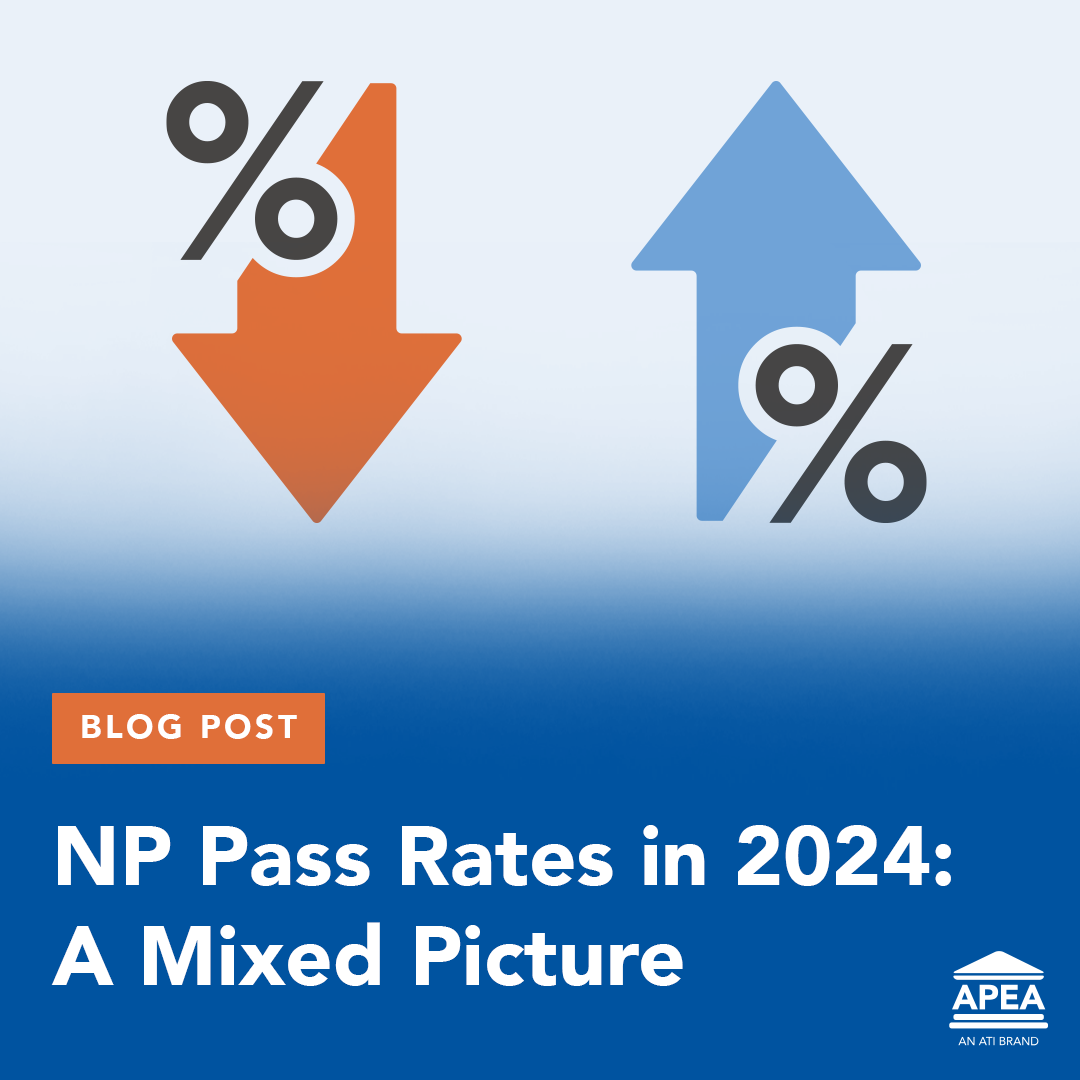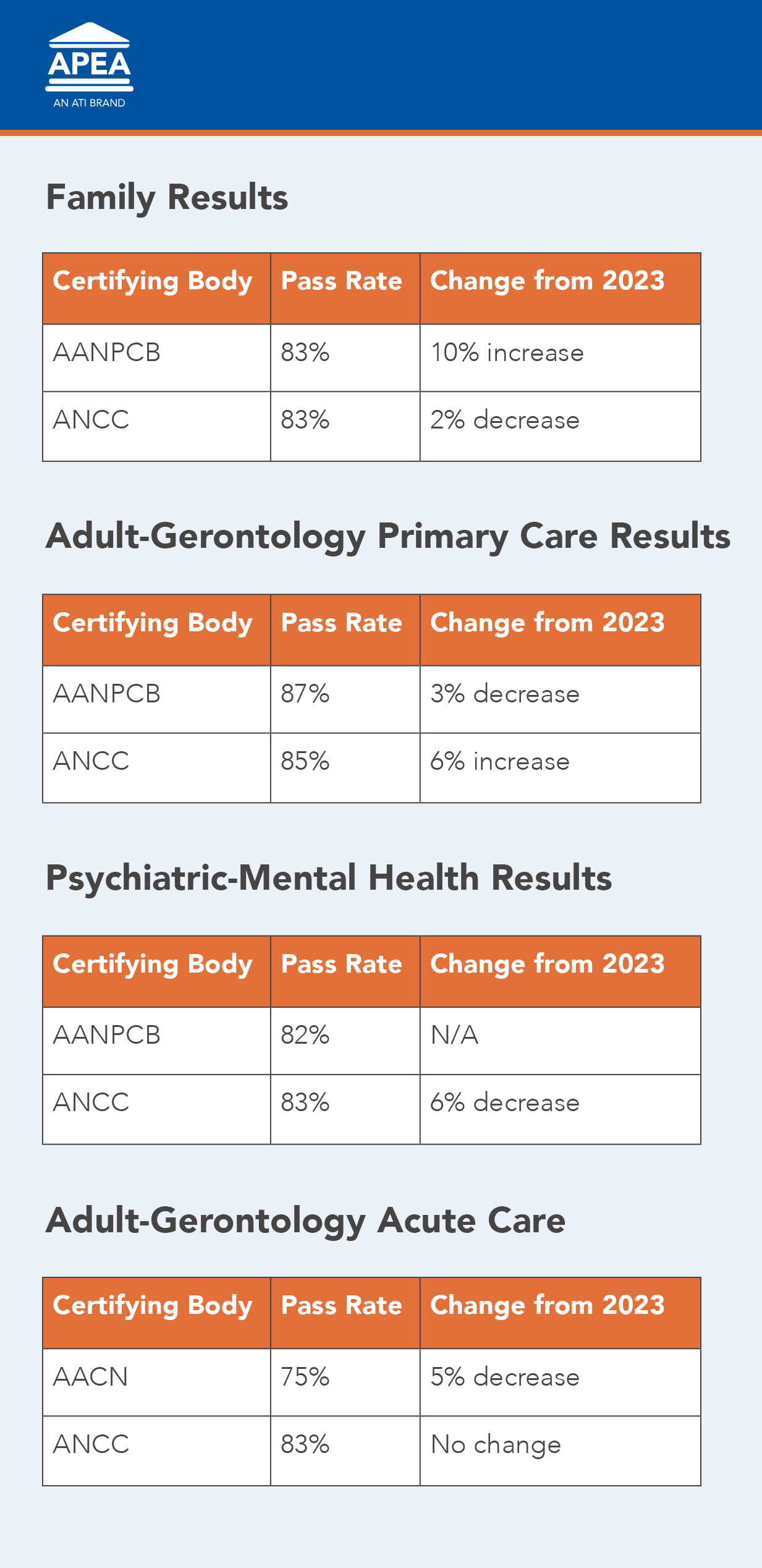FNP Pass Rates Bounce Back, but Overall 2024 Results Are Mixed
- July 16, 2025
Share:

After 5 years of steady decline, family nurse practitioner pass rates on the most prevalent certification exam made a dramatic comeback in 2024.
This rebound — a 10% increase — contrasts with continued declines on other NP certification exams. The mixed results highlight both progress and gaps in nurse practitioner preparation.
This article reports 2024 certification exam pass rates for the 4 most common nurse practitioner specialties and shares perspectives from nurse practitioners with deep expertise in education and certification exam prep.
FNP Pass Rate Rebounds After 5 Years of Declines
The most significant result in 2024 NP pass rates is the dramatic rebound on the exam taken by the majority of NP candidates.
After a 5-year slide — during which pass rates fell 13% — scores on the American Association of Nurse Practitioners Certification Board (AANPCB) exam for family nurse practitioners surged by 10%. The 2024 pass rate for the FNP exam from AANPCB was 83%, the highest result since 2019.
Meanwhile, the pass rate on the only other exam for FNPs was also 83%. But the number of FNP candidates who passed that exam, developed and administered by the American Nurses Credentialing Center (ANCC), dipped 2% in 2024.
This continued a downward trend on the ANCC FNP exam that began in 2020. Over that time span, pass rates were:
- 2021: 87%
- 2022: 86%
- 2023: 85%
- 2024: 83%.
See this NP Insider blog article for more detail on pass rates during the past 5 years.

Overall 2024 NP Pass Rates Declined Slightly
Outside of family practice, modest shifts occurred in the other most common NP specialties: adult-gerontology primary care, psychiatric-mental health, and adult-gerontology acute care.
- AGPCNP: For adult-gerontology primary care nurse practitioners, the pass rate on the AANPCB exam dropped 3%. On the AGNPCNP exam from ANCC, the pass rate increased 6%.
- PMHNP: In 2024, the AANPCB offered its inaugural exam for the psychiatric-mental health specialty, marking the first time that PMHNP candidates had two choices for certification. The pass rate on the first AANPCB for PMHNPs was 82% (6.76% of all PMHNP test takers). On the ANCC exam for PMHNPs, the pass rate was slightly higher, at 83%.
- AGACNP: Meanwhile, the adult-gerontology acute care nurse practitioner exam from American Association of Critical Care Nurses (AACN) experienced a concerning 5% drop — to 75%. The pass rate on the ANCC exam for AGACNPs held steady at 83%.
What’s Behind the AANPCB FNP Exam Rebound?
Educators and NP leaders say several factors may have contributed to the sharp improvement in AANPCB FNP pass rates. A major theme is the tightening of admission standards and a renewed focus on foundational knowledge.
“Many programs examined their admission criteria and decided to change some of their requirements,” said Betty Vicknair, APRN, MSN, PNP, a longtime consultant to academic programs who recently retired from APEA.
Vicknair said another strategy that helped some programs achieve better pass rates in 2024 was requiring post-master’s applicants to take a standardized test of their knowledge in pathophysiology, pharmacology and physical assessment (the 3 Ps) as part of the admission criteria. This 3P Exam was developed by APEA.
“This helped determine baseline knowledge in the three core courses,” Vicknair said. “If they did not score well on the 3P Exam and had received their first NP degree longer than 5 years prior, they required students to repeat the 3P core courses. This resulted in better performance during the program and improved first-attempt pass rates.”
Kathy Baldridge, DNP, FNP-BC, FAANP, the lead nurse practitioner education specialist for APEA, noted a third factor that may have contributed to higher pass rates on the FNP exam from AANPCB: the exam content.
“I believe that AANPCB likely took a critical look at their questions to make sure that they aligned with the AACN Essentials, which measure foundational knowledge for practice,” she said.
In addition, the knowledge and preparation of graduating students was also a factor. “I’ve seen a greater awareness among students about the importance of preparation,” Dr. Baldridge said.
Jennifer Smith, DNP, APRN, FNP-C, ENP-C, a nurse practitioner education specialist for APEA, added that the availability of high-quality review courses and study materials, such as those developed by APEA, also played a role.
“We are confident that one of the resources successful students use is the high-quality review course from APEA,” Dr. Smith said. “It thoroughly engages students, gives them confidence, and brings their graduate coursework full circle so that they can be successful on the certification exam.”
What’s Behind the ANCC FNP Exam Declines?
While scores on the AANPCB FNP exam improved, the FNP from ANCC exam continued its gradual decline. APEA nurse practitioner education specialists suggest that this may reflect a gap in how students are preparing for the broader scope of the ANCC exam, which includes nonclinical domains such as policy, ethics, and leadership.
“These domains are also part of the AACN Essentials and NONPF Competencies, but likely received less emphasis by students and faculty,” Dr. Baldridge said.
And although the ANCC exam has become more clinically aligned, these nonclinical domains may receive less emphasis by students and faculty.
“Incorporating active learning techniques will help students prepare for both clinical and nonclinical questions on their exam,” Dr. Baldridge recommended.
The AGACNP Exams: Scores That Raise Concerns
For adult-gerontology acute care practice, the pass rate of 75% on the AACN exam in 2024 merits introspection.
The 5% decline in pass rates on the AGACNP exam developed by the American Association of Critical Care Nurses (AACN) raises concerns about the adequacy of preparation in this specialty, the APEA nurse education specialists said.
“Lack of preparation and lack of adequate and appropriate clinical experience and preceptors are likely contributors to this result,” Vicknair said, adding that some accelerated programs structure courses that may be too brief to establish new knowledge.
Dr. Baldridge emphasized the importance of curriculum redesign in response to the new AACN Essentials and NONPF competencies.
“The universities that have higher pass rates have likely done the rigorous work of curricula redesign, to incorporate more active learning and critical thinking resources into their program,” she said. “The AACN Essentials and NONPF Competencies are inclusive of all population foci, so a shift in curriculum design is needed. The focus needs to be on simulation and case-based learning, as well as critical thinking and decision making.”
Looking Ahead: A Time for Reflection and Reform
The 2024 NP pass rate data tell a story of resilience, reform, and recalibration. The rebound in AANPCB FNP scores reflects the impact of multiple factors, including more targeted admission and improved learning and preparation strategies. For other specialties and exams, continuing challenges highlight the need for ongoing attention and improvements.
The National Task Force on Quality Nurse Practitioner Education has issued recommendations for standardizing NP education, outlined in the 2022 Standards for Quality Nurse Practitioner Education (NTF Standards).
Vicknair said that by adhering to the recommendations in the NTF Standards and the AACN Essentials, academic programs will become more standardized and effective.
“By ensuring that all nurse practitioner graduates receive a consistent level of training, we can equip them with the skills and knowledge that employers expect,” Vicknair said.
In addition, as programs incorporate more competency-based education models, pass rates are likely to continue improving.
“I think that as the transition in curriculum continues, we will see continued improvement in the pass rates,” Dr. Baldridge said.
Preparing New NPs for Clinical Practice
All of the education experts interviewed emphasized that the ultimate goal of every NP program is not just to pass a certification exam but to prepare new nurse practitioners who are confident, competent, and ready to practice. This requires the assessment of foundational knowledge and competencies.
“To ensure students are adequately prepared for the certification exam and clinical practice, faculty should focus on 3P foundational knowledge early in their programs, identify areas in which students need reinforcement, and ensure those gaps are closed prior to graduation,” Dr. Smith said. “Additionally, regular assessment of student competency is essential throughout the program to ensure students are on track and capturing the knowledge base needed for the demands on clinical practice and certification success.”
Dr. Baldridge emphasized the same needs and said she expects that strategic, evidence-based changes in education will continue to product measurable improvement in pass rates.
“The mixed outcomes across specialties reaffirm that our work is not done,” she said. “We must remain committed to aligning curricula with national standards, investing in active learning, and ensuring that every graduate is fully equipped — not only to pass an exam, but to deliver safe, competent, and compassionate care in a complex healthcare landscape."
For information on program and faculty resources to measure 3P knowledge and predict student readiness for the certification exams, see the APEA Faculty Resource Center.
For information on live and on-demand certification review courses for FNPs, AGPCNPs, PMHNPs and AGACNPs, visit the Courses page.
To connect with a faculty consultant, email requestinfo@apea.com.